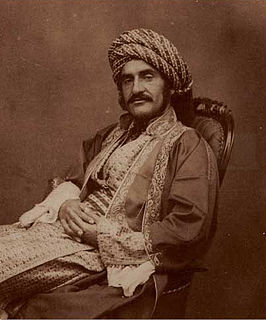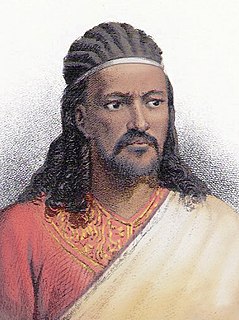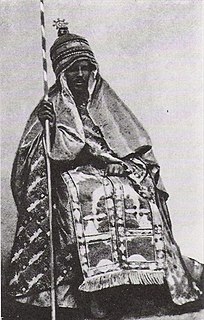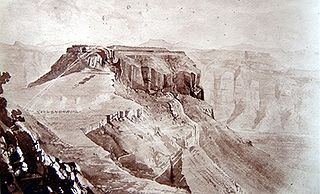
Charles Duncan Cameron (1825-1870) was a British soldier who was serving as British consul in Ethiopia when he was imprisoned by Emperor Tewodros II as one of the acts which led to the 1868 Expedition to Abyssinia.

Charles Duncan Cameron (1825-1870) was a British soldier who was serving as British consul in Ethiopia when he was imprisoned by Emperor Tewodros II as one of the acts which led to the 1868 Expedition to Abyssinia.
Cameron was the son of Colonel Allan Cameron, 3rd Buffs, and was born in the Isle of Man in 1825. He entered the army 19 May 1846, by purchasing the commission of an ensign in the 45th Foot, and served with that unit until July 1851. During this time he was attached to the native levies during the Kaffir war of 1846–7. Having settled in Natal on his retirement from the 45th, he was employed by (afterwards Sir) B.C. Pine, then lieutenant-governor of that colony, on diplomatic service in the Zulu country, and acted as Kaffir magistrate in the Klip river district of Natal. He commanded the Kaffir irregulars sent from Natal to the Cape Colony overland during the war of 1851–2. At the outbreak of the Crimean war he was appointed to the staff of Sir Fenwick Williams, her majesty's commissioner with the Turkish army, receiving the local rank of captain. He was placed in command of the fortifications under construction at Erzeroum, and after the fall of Kars was detached on special service to Trebizond until September 1856. For his military services he received the Kaffir and Turkish war medals, and the Turkish medal for his service at Kars. [1]
Cameron entered the civil service, and was appointed vice-consul at Redout Kale in April 1858, and was removed to Poti in 1859. He was appointed British consul in Abyssinia to reside at Massawa in 1860, and left for his new posting in November 1861, arriving there 9 January 1862. He accompanied the Grand Duke of Saxe-Cobourg during a visit to the interior in that year. [1] Cameron afterwards left Massawa to deliver to Emperor Tewodros a royal letter and presents from Queen Victoria, arriving at Gondar 23 June 1862, and reaching the Emperor's camp that October. [2] In his report back to the British Foreign Office, Cameron included a letter from the Ethiopian Emperor, which went unread. [3]
Meanwhile, Consul Cameron went on a visit to the Bogos, where he worked to re-establish British influence, as well as the towns of Kassala and Metemma, returning to Ethiopia in June 1863. Once there, he stayed with the missionaries at Jenda in Dembiya. His visit to the Sudan raised Emperor Tewodros' suspicions, but more important to the Emperor was the lack of a reply to his own letter to Queen Victoria. [4] In response to the Emperor's concern, Cameron reportedly offered his own head if a response did not come within two months. The Emperor took his frustration out on one of the missionaries, Henry Aaron Stern, who had mentioned the Emperor's humble beginnings in his book. Stern watched his servants beaten to death, then he with his associate Rosenthal, were "chained, severely treated, and the latter thrashed on several occasions." [5] Consul Cameron spent the following months unsuccessfully working to secure Stern's release. When the long-awaited response to his report finally arrived 22 November 1863, it contained a reprimand to Cameron for his travels beyond Massawa and an order to return to that port; there was not even a mention of the Emperor's letter. [6] Cameron still pleaded with Tewodros for patience, and permission to obey his superiors' commands and return to Massawa; the Emperor, who had become deeply suspicious, on 3 January 1864 ordered the British Consul, his European staff, and the four missionaries at Jenda put into chains. Cameron was forced to then write to London a succinct message: "No release until civil answer to King's letter arrives." [7]
Cameron remained Tewodros's prisoner until after the arrival of Hormuzd Rassam at the Emperor's camp in January 1865. Rassam had been sent with a copy of the belated reply to the Emperor's letter to obtain the release of all of Tewodros' European captives, and had spent the better part of a year forced to wait in Massawa before he could travel inland. [8] Although released after a show trial, Cameron, the missionaries, and even their rescuer Rassam were arrested once more, and confined to Maqdala from 12 July 1866, until released, with the other prisoners, on the appearance of the British army before Maqdala, 11 April 1868. Cameron returned to England in July 1868, and retired on a pension in December of the same year. He died at Geneva on 30 May 1870. [1]
Cameron was elected fellow of the Royal Geographical Society in 1858.

Hormuzd Rassam, was an Assyriologist and author.

Field Marshal Robert Cornelis Napier, 1st Baron Napier of Magdala was a British Indian Army officer. He fought in the First Anglo-Sikh War and the Second Anglo-Sikh War before seeing action as chief engineer during the second relief of Lucknow in March 1858 during the Indian Rebellion of 1857. He also served in the Second Opium War as commander of the 2nd division of the expeditionary force which took part in the Battle of Taku Forts, the surrender of Peking's Anting Gate and the entry to Peking in 1860. He subsequently led the punitive expedition to Abyssinia July 1867, defeating the Emperor Tewodros II of Ethiopia with minimal loss of life among his own forces and rescuing the hostages of Tewodros.

Tewodros II was Emperor of Ethiopia from 1855 until his death in 1868. His rule is often placed as the beginning of modern Ethiopia and brought an end to the decentralized Zemene Mesafint.
Yohannes III was Emperor of Ethiopia intermittently between 1840 and 1851, and a member of Solomonic dynasty. He was the son of Tekle Giyorgis. He was largely a figurehead, with real power in the hands of the Enderase or Regent, Ras Ali II a princeling of the Yejju Dynasty. Ras Ali's mother was the Empress Menen Liben Amede.

Yohannes IV was Emperor of Ethiopia from 1871 to his death in 1889 at the Battle of Gallabat, and king of Ethiopia from 1869 to 1871.
Amba Mariam is a village in central Ethiopia. It was known as Magdala or Makdala during the reign of Emperor Tewodros II (1855-1868). Located in the Debub Wollo Zone of the Amhara Region, Amba Mariam has a longitude and latitude of 11°12′N39°17′E.

Pope Cyril IV of Alexandria , Coptic: Ⲡⲁⲡⲁ Ⲁⲃⲃⲁ Ⲕⲩⲣⲓⲗⲗⲟⲩ ⲇ̅ 110th Pope of Alexandria & Patriarch of the See of St. Mark. He was born David (Daoud) in 1816. Despite his relatively short papacy, he is regarded as the "Father of Reform" of the Coptic Orthodox Church in modern times. He is credited for establishing a great printing house and printing many Church books.

Haile Malakot was Negus of Shewa, a historical region of Ethiopia, from 12 October 1847 until his death. He was the oldest son of Negus Sahle Selassie an important Amhara noblemen and his wife Woizero Bezabish Wolde.
Sahle Dengel was Emperor of Ethiopia intermittently between 1832 and 11 February 1855, towards the end of the Zemene Mesafint. He was largely a figurehead, with real power in the hands of Ali II of Yejju.
John Charles Kirkham was a British adventurer, hotelier and ship's steward who fought beside William Walker in Nicaragua and Charles George Gordon in China during the Taiping Rebellion before landing in Ethiopia at the beginning of the British Expedition to Abyssinia against Emperor Tewodros II in 1868. At the conclusion of the latter campaign, Kirkham stayed in the country and became the main Western advisor to Emperor Yohannes IV. He was instrumental in training Ethiopian troops to Western military standards, raising and drilling what became known as the Emperor's Disciplined Force.

The British expedition to Abyssinia was a rescue mission and punitive expedition carried out in 1868 by the armed forces of the British Empire against the Ethiopian Empire. Emperor Tewodros II of Ethiopia, then often referred to by the anglicized name Theodore, imprisoned several missionaries and two representatives of the British government in an attempt to force the British government to comply with his requests for military assistance. The punitive expedition launched by the British in response required the transportation of a sizable military force hundreds of miles across mountainous terrain lacking any road system. The formidable obstacles to the action were overcome by the commander of the expedition, General Sir Robert Napier, who captured the Ethiopian capital, and rescued all the hostages. The expedition was widely hailed on its return for achieving all its objectives.

The Battle of Magdala was the conclusion of the British Expedition to Abyssinia fought in April 1868 between British and Abyssinian forces at Magdala, 390 miles (630 km) from the Red Sea coast. The British were led by Robert Napier, while the Abyssinians were led by Emperor Tewodros II.

Walter Charles Metcalf Chichele Plowden was a British diplomat, consul at Massawa on the Red Sea coast from 1848 to his death. He played a role in Ethiopian politics in the mid 19th-century: during his tenure he cultivated the friendship of first Ras Ali, and later the Ethiopian emperor Tewodros II.

Tristram Charles Sawyer Speedy was a well-known English explorer and adventurer during the Victorian era.
Tewabech Ali was the first wife of Kassa Haile, better known as Emperor Tewodros II of Ethiopia. They were married in 1848.

The Army of the Ethiopian Empire was the principal land warfare force of the Ethiopian Empire and had naval and air force branches in the 20th century. The organization existed in multiple forms throughout the history of the Ethiopian Empire from its foundation in 1270 by Emperor Yekuno Amlak, to the overthrow of the monarchy and Emperor Haile Selassie in 1974 by members of the Ethiopian army. Due to the country's position along multiple trade routes and its maintenance of independence against multiple Islamic and colonialist invasions lead to multiple conflicts against numerous major countries including the Ottomans, Egyptians, British, and Italians.

Abyssinia is a battle honour awarded to units of the British Indian Army and the British Army which participated in the 1868 campaign to free Europeans held hostage in Abyssinia by Emperor Tewodros II. The success of the expedition led to the award of this honour to units of the British Indian Army which had participated in the campaign. The units belonged, with the exception of the Madras Sappers, to the Bengal and Bombay Presidency Armies.

Ras Alula Engida was an Ethiopian general and politician who successfully led Ethiopian battles. He was one of the most important leaders of the Ethiopian Empire forces during the 19th century. Ras Alula Described by Haggai Erlich as the "greatest leader whom Ethiopia produced since the death of Emperor Tewodros II in 1868." Ras Alula was referred to by Europeans as "the Garibaldi of Ethiopia".

Henry Aaron Stern was an Anglican missionary and captive in Abyssinia.
Moritz Hall was a Polish Christian missionary, metalworker, timber merchant, and hotel proprietor.